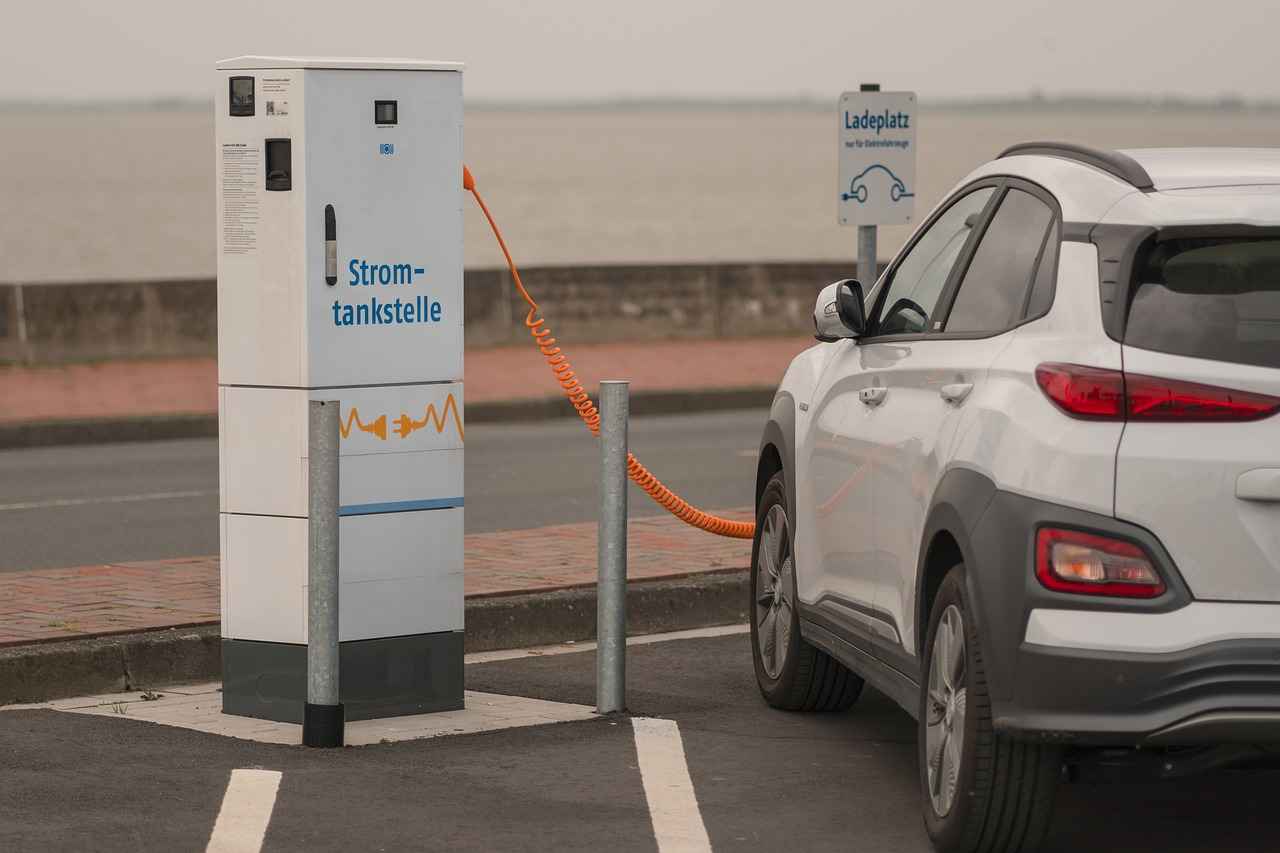This article delves into the emerging trends and innovations within the electric bike industry, emphasizing what we can expect in 2025 and how these advancements will significantly impact urban mobility.
1. Advancements in Battery Technology
Battery technology remains a pivotal element in the evolution of electric bikes. The introduction of solid-state batteries promises to enhance performance, increase longevity, and improve charging efficiency. These advancements will allow riders to travel longer distances without frequent recharging.
2. Smart Connectivity Features
With the rise of smart connectivity, electric bikes are becoming more integrated with technology. Riders can now access real-time data, navigation, and safety features through dedicated apps, enhancing their overall biking experience.
- GPS and Navigation Systems: These systems are becoming standard, assisting riders in route planning and tracking.
- Real-Time Traffic Updates: By adapting routes based on current conditions, electric bikes can ensure a smoother ride.
- Safety Alerts: Notifications for potential hazards help reduce accidents and improve safety.
3. Lightweight and Durable Materials
The evolution of materials science is leading to the use of carbon fiber and aluminum alloys in electric bike manufacturing. These materials not only reduce weight but also enhance strength, contributing to better performance.
4. Enhanced Motor Technologies
Innovations in motor design are making electric bikes more efficient and powerful. The distinction between hub and mid-drive motors can significantly affect performance, catering to various riding styles.
5. Customization and Personalization Options
Customization is becoming increasingly important for riders. Options for adjustable components and aesthetic choices allow users to tailor their bikes to personal preferences, enhancing comfort and style.
6. Urban Infrastructure and Electric Bikes
As cities adapt to the growing number of electric bike users, investments in dedicated bike lanes and parking solutions are critical for safety and convenience.
7. The Role of E-Bike Sharing Programs
E-bike sharing initiatives are promoting sustainable transportation, making electric bikes accessible to a wider audience and contributing to reduced carbon footprints.
8. The Future of E-Bike Regulations
As electric bikes gain popularity, new regulations are being developed to ensure safety and reliability on the roads, influencing manufacturing practices.
9. The Impact of COVID-19 on Electric Bike Popularity
The pandemic has accelerated the adoption of electric bikes as individuals seek safer, personal mobility solutions. This shift is likely to have long-lasting effects on commuting habits.
10. Environmental Benefits of Electric Bikes
Electric bikes contribute to reduced emissions and less traffic congestion, promoting a greener urban lifestyle.
Conclusion: The Road Ahead for Electric Bikes
As we approach 2025, the electric bike industry is set for remarkable advancements. The trends and innovations discussed will not only enhance the biking experience but also play a crucial role in shaping the future of urban mobility.

1. Advancements in Battery Technology
Advancements in Battery Technology are revolutionizing the electric bike industry, paving the way for enhanced performance, extended longevity, and improved charging efficiency. As we move towards 2025, understanding these advancements is crucial for both manufacturers and consumers.
At the core of these innovations are lithium-ion batteries, which have become the standard for electric bikes due to their high energy density and lightweight properties. These batteries allow for longer rides on a single charge, making them ideal for urban commuting and recreational use.
However, the future is also looking bright with the advent of solid-state batteries. Unlike traditional lithium-ion batteries, solid-state batteries use a solid electrolyte, which can significantly improve safety by reducing the risk of leaks and fires. Additionally, they offer higher energy densities, which means that electric bikes can achieve greater ranges without increasing weight.
| Battery Type | Advantages | Challenges |
|---|---|---|
| Lithium-Ion | High energy density, lightweight, widely available | Limited lifespan, potential safety hazards |
| Solid-State | Higher safety, longer lifespan, better energy density | High production costs, still in development |
Moreover, advancements in charging technology are also noteworthy. Fast-charging capabilities are becoming more common, allowing riders to recharge their batteries in a fraction of the time it previously took. This means less downtime and more time on the road.
In conclusion, as battery technology continues to evolve, electric bike manufacturers are poised to offer products that not only meet the demands of modern riders but also contribute to a more sustainable future. The integration of advanced battery technologies is set to enhance the overall biking experience, making electric bikes a more attractive option for a wider audience.

2. Smart Connectivity Features
Smart connectivity is transforming the biking experience like never before. As electric bikes become increasingly popular, the integration of advanced technology is providing riders with unparalleled access to real-time data, navigation, and safety features. This evolution not only enhances the overall riding experience but also promotes safer urban mobility.
One of the most significant advancements in smart connectivity is the incorporation of integrated apps. These applications allow riders to track their performance, monitor battery life, and even locate nearby charging stations. With a simple tap on their smartphones, cyclists can access a wealth of information, making their rides more efficient and enjoyable.
- Real-Time Data: Riders can now receive instant updates on their speed, distance traveled, and estimated time of arrival at their destinations. This information is crucial for planning routes and ensuring timely commutes.
- Navigation: Integrated GPS systems guide cyclists through the best routes, avoiding traffic congestion and identifying bike-friendly paths. This feature is particularly useful in urban environments where navigation can be challenging.
- Safety Features: Enhanced connectivity allows for the implementation of safety alerts that notify riders of potential hazards, such as nearby vehicles or road conditions. These notifications can significantly reduce the risk of accidents.
Furthermore, the integration of IoT technology is paving the way for smarter biking solutions. Electric bikes equipped with IoT sensors can communicate with other devices, providing a seamless experience. For instance, smart helmets can connect to the bike, offering audio navigation prompts or alerts about incoming messages.
As we look towards the future, the importance of smart connectivity in electric bikes cannot be overstated. It not only enhances the rider’s experience but also contributes to a safer, more efficient urban transport system. With continued advancements in technology, the biking community can expect even more innovative features that will further redefine the way we ride.
2.1 GPS and Navigation Systems
GPS and navigation systems have become integral features in modern electric bikes, enhancing the overall riding experience and ensuring greater safety for users. As urban environments evolve and the popularity of electric bikes continues to rise, these technological advancements are proving essential for both novice and experienced riders.
One of the primary benefits of incorporating GPS technology into electric bikes is the ability to plan routes effectively. Riders can easily input their destination into a connected app, which then calculates the best route based on factors such as distance, elevation, and bike lanes. This feature not only saves time but also allows riders to avoid congested areas, ensuring a smoother journey.
Moreover, GPS systems provide real-time tracking of rides, which is particularly beneficial for safety. In case of an emergency or if a bike is stolen, riders can quickly locate their bike using GPS coordinates. This capability offers peace of mind, especially in urban settings where theft can be a concern.
Additionally, many electric bikes equipped with GPS also offer real-time traffic updates. This feature allows riders to adapt their routes based on current traffic conditions, helping them avoid delays and ensuring a more efficient ride. With the ability to receive notifications about road closures, accidents, or heavy traffic, riders can make informed decisions on the go.
Furthermore, the integration of GPS with mobile applications enhances the riding experience by providing performance metrics. Riders can track their speed, distance traveled, and even calories burned, making it easier to monitor fitness goals. This data can be invaluable for those looking to improve their cycling performance or maintain a healthy lifestyle.
In conclusion, the incorporation of GPS and navigation systems in electric bikes is revolutionizing the way we ride. With features that assist in route planning, real-time tracking, and performance monitoring, these advancements are not just about convenience; they significantly contribute to rider safety and overall satisfaction. As technology continues to evolve, we can expect even more innovative features that will further enhance the electric biking experience.
2.1.1 Real-Time Traffic Updates
Real-time traffic updates are becoming an essential feature in the world of electric bikes, significantly enhancing navigation efficiency. With the rapid development of technology, electric bikes are now equipped with sophisticated GPS and navigation systems that provide riders with timely information about current traffic conditions. This advancement is crucial for urban riders who often encounter unpredictable traffic patterns.
One of the primary benefits of real-time traffic updates is the ability to adapt routes dynamically. Electric bikes can analyze traffic data and suggest alternative paths that avoid congested areas, ensuring a smoother and more enjoyable ride for users. This feature not only saves time but also reduces the stress associated with navigating through heavy traffic.
Moreover, these updates can be integrated with smart connectivity features found in many modern electric bikes. Riders can receive notifications directly on their handlebars, allowing them to make informed decisions without having to look down at their smartphones. This integration promotes safety by keeping the rider’s focus on the road.
In addition to improving navigation, real-time traffic updates can also play a vital role in enhancing overall safety. By alerting riders to potential hazards, such as accidents or road closures, these systems can help prevent accidents and ensure a safer riding experience. Riders can adjust their routes accordingly, avoiding areas that may pose risks.
As urban areas continue to evolve, the demand for efficient and safe transportation options will grow. Real-time traffic updates will undoubtedly become a standard feature in electric bikes, shaping the future of urban mobility. Riders can look forward to a more connected and responsive biking experience, making electric bikes a viable alternative to traditional commuting methods.
2.1.2 Safety Alerts and Notifications
Safety alerts and notifications play a vital role in enhancing the safety of urban riders on electric bikes. As cities become increasingly congested and unpredictable, the need for effective communication between riders and their environment is more important than ever. With the integration of smart connectivity features in electric bikes, riders can receive timely alerts about potential hazards, significantly reducing the risk of accidents.
These alerts can include notifications about nearby vehicles, road conditions, and even weather changes, helping riders make informed decisions while navigating urban landscapes. For instance, when a rider approaches a busy intersection, their bike can alert them to the presence of vehicles or pedestrians, allowing for safer maneuvering.
Additionally, the integration of real-time data allows for adaptive responses. If a rider is traveling in an area known for heavy traffic, their bike can suggest alternative routes or warn them of upcoming obstacles. This level of awareness not only enhances personal safety but also contributes to a more efficient riding experience.
Moreover, safety alerts can be linked with wearable technology, such as smartwatches, providing riders with notifications directly on their wrists. This hands-free approach ensures that riders remain focused on the road while staying informed about their surroundings.
In conclusion, the implementation of safety alerts and notifications in electric bikes represents a significant advancement in urban mobility. By leveraging smart connectivity, these features empower riders with the information they need to navigate safely and confidently in bustling city environments. As technology continues to evolve, we can expect even more sophisticated safety systems that prioritize rider security and enhance the overall biking experience.
2.2 Integration with Wearable Technology
Integration with Wearable Technology is rapidly becoming a significant trend in the electric bike industry. As health and fitness continue to take center stage in our daily lives, the synergy between smartwatches, fitness trackers, and electric bikes is proving to be a game-changer for both recreational and serious cyclists.
Modern electric bikes are now equipped with advanced connectivity features that allow them to sync seamlessly with various wearable devices. This integration enables riders to monitor crucial health metrics such as heart rate, calories burned, and distance traveled in real time. By leveraging this technology, cyclists can gain valuable insights into their physical performance and adjust their riding strategies accordingly.
| Wearable Device | Key Features | Benefits for Cyclists |
|---|---|---|
| Smartwatches | Heart rate monitoring, GPS tracking, notifications | Real-time health monitoring, route navigation |
| Fitness Trackers | Step counting, sleep tracking, activity logs | Holistic view of fitness, motivation to stay active |
Moreover, this integration facilitates enhanced safety features. For instance, riders can receive alerts about potential hazards or receive notifications when they exceed certain health thresholds, such as an elevated heart rate. This proactive approach to safety not only enhances the riding experience but also promotes healthier lifestyles.
As we look ahead, the collaboration between electric bikes and wearable technology is expected to evolve further. Innovations such as real-time performance analytics and personalized coaching features are on the horizon, promising to make cycling even more engaging and beneficial. The future of cycling is not just about getting from point A to point B; it’s about optimizing the journey and enhancing overall well-being.
In conclusion, the integration of wearable technology with electric bikes represents a significant leap forward in the cycling experience. By providing essential health data and safety features, this synergy is set to transform how we approach cycling, making it a more informed and enjoyable activity.

3. Lightweight and Durable Materials
The use of lightweight and durable materials is a game-changer in the electric bike industry, significantly influencing design and performance. As manufacturers strive to improve efficiency and rider experience, advancements in materials science are paving the way for innovative solutions.
Traditionally, electric bikes were constructed using heavier materials, which often compromised performance. However, with the advent of advanced composites and metallurgical innovations, manufacturers are now able to produce frames that are not only lighter but also stronger and more resilient.
| Material | Benefits |
|---|---|
| Carbon Fiber | High strength-to-weight ratio, corrosion-resistant, and excellent vibration dampening. |
| Aluminum Alloys | Lightweight, affordable, and offers good resistance to fatigue. |
| Titanium | Exceptional strength, lightweight, and highly durable. |
One of the most significant trends is the use of carbon fiber. This material allows for the creation of frames that are incredibly light, leading to improved acceleration and handling. Moreover, carbon fiber frames can be designed with complex shapes that enhance aerodynamics, further boosting performance.
In addition to carbon fiber, aluminum alloys have become increasingly popular due to their balance of weight and strength. They are less expensive than carbon fiber and provide a robust alternative for many e-bike models. Furthermore, the use of sustainable materials is gaining traction, as manufacturers look to minimize their environmental impact while still delivering high-quality products.
As we look to the future, the integration of these lightweight and durable materials will continue to shape the electric bike landscape. Enhanced performance, greater efficiency, and improved rider comfort are just a few of the benefits that come with these advancements. The ongoing evolution in materials science promises to deliver even more exciting innovations in electric bike design.
3.1 Carbon Fiber and Aluminum Alloys
Carbon fiber and aluminum alloys have become increasingly popular materials in the bicycle manufacturing industry, providing significant advantages in terms of weight reduction and strength. These materials not only enhance the performance of bicycles but also contribute to a more enjoyable riding experience.
One of the primary benefits of carbon fiber is its remarkable strength-to-weight ratio. This means that carbon fiber frames are not only lightweight but also incredibly strong, allowing manufacturers to create bikes that are both fast and durable. Riders can experience improved acceleration and handling without the burden of excess weight. Additionally, carbon fiber’s ability to absorb vibrations results in a smoother ride, enhancing overall comfort on various terrains.
On the other hand, aluminum alloys are known for their affordability and ease of manufacturing. Aluminum frames are generally less expensive than carbon fiber, making them a popular choice for entry-level and mid-range bikes. Despite being heavier than carbon fiber, modern aluminum alloys have been engineered to provide excellent strength and rigidity, ensuring that bikes remain responsive and agile.
| Material | Weight | Strength | Cost | Ride Quality |
|---|---|---|---|---|
| Carbon Fiber | Lightweight | High | Expensive | Smooth |
| Aluminum Alloys | Moderate | Good | Affordable | Responsive |
In conclusion, the choice between carbon fiber and aluminum alloys ultimately depends on the rider’s needs and budget. Both materials offer unique advantages that can significantly enhance the biking experience. As technology continues to advance, we can expect even more innovations in material science, further improving the performance and enjoyment of bicycles.
3.2 Sustainable Materials in Production
Sustainability is rapidly becoming a cornerstone in the electric bike manufacturing industry. As environmental concerns grow, manufacturers are increasingly prioritizing eco-friendly materials and sustainable practices to shape the future of electric bike production.
The shift towards sustainability is not just a trend; it is a necessary evolution in response to global climate change and consumer demand for greener products. Companies are exploring various eco-friendly materials that minimize environmental impact while maintaining performance and durability. Some of these materials include:
- Recycled Aluminum: Utilizing recycled aluminum not only reduces waste but also lowers energy consumption during production. This material is lightweight, enhancing bike performance.
- Bamboo: Bamboo is a renewable resource that offers strength and flexibility. Its use in bike frames provides a unique aesthetic while being environmentally friendly.
- Biodegradable Plastics: These plastics are made from natural materials and break down more easily than traditional plastics, reducing long-term waste in landfills.
In addition to materials, manufacturers are adopting sustainable production practices that minimize carbon footprints. This includes:
- Energy-Efficient Manufacturing: Factories are increasingly using renewable energy sources, such as solar and wind, to power their operations.
- Waste Reduction Techniques: Implementing practices that reduce waste during production, such as recycling scrap materials and optimizing supply chains.
- Ethical Labor Practices: Ensuring fair labor practices throughout the supply chain contributes to a more sustainable and socially responsible production model.
As we look to the future, the integration of sustainability in electric bike manufacturing is expected to grow. This shift not only benefits the environment but also appeals to a growing segment of consumers who value eco-conscious products. By embracing sustainable materials and practices, the electric bike industry is paving the way for a greener, more sustainable future.

4. Enhanced Motor Technologies
Enhanced Motor Technologies are at the heart of the electric bike revolution, driving significant improvements in performance and user experience. As the demand for electric bikes continues to grow, manufacturers are focusing on innovative motor designs that enhance torque, speed, and overall efficiency.
Electric motors have come a long way, evolving from basic designs to sophisticated systems that provide higher efficiency and better performance. Modern motors are now capable of delivering impressive torque, allowing riders to tackle steep hills and challenging terrains with ease.
- Torque: New motor designs are enhancing torque delivery, providing riders with the power needed for quick accelerations and steep climbs.
- Speed: Advanced motor technology is enabling electric bikes to reach higher speeds, making them suitable for both urban commuting and recreational riding.
When it comes to motor placement, hub motors and mid-drive motors offer distinct advantages:
| Motor Type | Advantages | Disadvantages |
|---|---|---|
| Hub Motors | Quiet operation, low maintenance, and easy installation. | Less torque for steep climbs and uneven terrains. |
| Mid-Drive Motors | Higher torque and better weight distribution, ideal for off-road conditions. | More complex maintenance and potentially higher costs. |
Another exciting advancement is the regenerative braking system, which allows electric bikes to recover energy during braking. This not only extends battery life but also enhances the overall efficiency of the bike. By converting kinetic energy back into stored energy, riders can enjoy longer rides without frequent recharges.
As motor technology continues to evolve, electric bikes are becoming more powerful and efficient than ever before. With improvements in torque, speed, and innovative features like regenerative braking, the future of electric biking looks promising. Riders can expect a more enjoyable, efficient, and sustainable commuting experience.
4.1 Hub vs. Mid-Drive Motors
The choice between hub and mid-drive motors can significantly affect bike performance. Each motor type has its own unique advantages and disadvantages, catering to different riding styles and preferences. Understanding these differences is crucial for anyone considering an electric bike.
| Motor Type | Advantages | Disadvantages |
|---|---|---|
| Hub Motors |
|
|
| Mid-Drive Motors |
|
|
When choosing between these two motor types, consider your riding environment and personal preferences. For instance, if you frequently ride in urban areas with flat roads, a hub motor might be more suitable due to its simplicity and low maintenance. However, if you enjoy off-road biking or tackling steep hills, a mid-drive motor could provide the performance and efficiency you need.
In conclusion, understanding the hub vs. mid-drive motor debate is essential for making an informed decision about your electric bike. Each motor type offers distinct benefits and drawbacks, so aligning your choice with your riding style will enhance your overall biking experience.
4.2 Regenerative Braking Systems
Regenerative braking systems are revolutionizing the way electric bikes operate, providing a unique blend of efficiency and sustainability. These systems are designed to recover energy that would typically be lost during braking, making them an essential feature in modern electric bike technology.
When a rider applies the brakes, the regenerative braking system captures kinetic energy and converts it back into electrical energy. This energy is then stored in the bike’s battery, allowing for extended battery life and improved overall performance. The process not only enhances the bike’s range but also reduces the frequency of battery charging, which is particularly advantageous for long-distance riders.
One of the most significant benefits of regenerative braking systems is their contribution to energy recovery. During rides, especially in urban environments where frequent stops occur, these systems can significantly increase the bike’s efficiency. By harnessing energy that would otherwise be wasted, riders can enjoy longer journeys without the constant worry of running out of power.
| Benefits of Regenerative Braking | Description |
|---|---|
| Increased Range | Allows for longer rides by recovering energy during braking. |
| Battery Longevity | Reduces wear and tear on the battery by minimizing the need for frequent charging. |
| Improved Safety | Provides smoother deceleration, enhancing rider control. |
As electric bike technology continues to evolve, regenerative braking systems are becoming more sophisticated. Manufacturers are integrating advanced algorithms that optimize energy recovery based on riding conditions, further enhancing the rider’s experience. This innovation not only makes electric bikes more appealing but also aligns with the growing demand for sustainable transportation solutions.
In conclusion, the incorporation of regenerative braking systems in electric bikes represents a significant step forward in the quest for efficiency and sustainability. As these systems become more prevalent, they will undoubtedly play a crucial role in shaping the future of urban mobility.

5. Customization and Personalization Options
Customization has become an essential aspect for many electric bike users, reflecting the growing demand for personalized features that cater to individual preferences and needs. As electric bikes gain popularity, manufacturers are increasingly focusing on providing options that allow riders to tailor their bikes to their unique styles and requirements.
One of the most significant trends in electric bike customization is the ability to adjust various components for enhanced comfort. Riders can now modify features such as:
- Seat Height: Customizing the seat height ensures that riders can maintain a comfortable posture while pedaling.
- Handlebar Position: Adjustable handlebars allow users to find the most ergonomic position, reducing strain during long rides.
- Suspension Settings: Some bikes offer adjustable suspension, enabling riders to fine-tune their ride quality based on terrain.
Aesthetic customization options are also expanding, allowing riders to express their personal style. Customization choices include:
- Color Variations: Riders can choose from a wide range of colors to make their electric bikes stand out.
- Graphic Designs: Many manufacturers offer customizable decals or wraps, enabling riders to add unique graphics.
- Accessories: From custom grips to unique lighting options, accessories allow for further personalization.
As technology continues to evolve, so does the ability to personalize the riding experience through integrated tech features. Riders can now:
- Smartphone Apps: Many electric bikes come with companion apps that allow users to track their rides, customize settings, and receive maintenance reminders.
- Performance Settings: Riders can adjust motor assistance levels, throttle response, and other performance metrics to suit their riding style.
In conclusion, the trend of customization in electric bikes is not just about aesthetics; it’s about creating a more personalized and comfortable riding experience. As manufacturers continue to innovate, riders can expect even more options to tailor their bikes to fit their lifestyles and preferences.
5.1 Adjustable Components for Comfort
Adjustable components play a crucial role in enhancing rider comfort on electric bikes. These features allow users to personalize their riding experience, ensuring that each journey is both enjoyable and efficient. By tailoring aspects such as seat height and handlebar position, riders can significantly improve their overall comfort and control.
One of the most important adjustable components is the seat height. Being able to modify the seat height allows riders to achieve an optimal leg extension while pedaling. This adjustment not only helps in reducing fatigue during long rides but also minimizes the risk of injury. Riders can find their ideal seat height by following these steps:
- Stand next to the bike and adjust the seat so that it is level with your hip.
- Sit on the bike and ensure that your leg is slightly bent at the bottom of the pedal stroke.
- Make fine adjustments as necessary for comfort.
Another significant feature is the handlebar position. Adjustable handlebars can be raised or lowered, allowing riders to find a comfortable grip that suits their riding style, whether it be sporty or relaxed. This customization can help to alleviate strain on the back and wrists, particularly during extended rides. Here’s how to adjust handlebars effectively:
- Loosen the handlebar clamp using an appropriate tool.
- Raise or lower the handlebars to a comfortable height.
- Tighten the clamp securely before riding.
In addition to seat heights and handlebar positions, other adjustable components, such as suspension settings and pedal types, can also be customized. Riders should explore these options to further enhance their comfort and riding experience. Overall, the ability to adjust various components on electric bikes empowers riders to create a setup that meets their specific needs, leading to more enjoyable and efficient rides.
5.2 Aesthetic Customization Choices
Aesthetic customization options for electric bikes are becoming increasingly diverse, allowing riders to express their unique personalities and styles. As the popularity of electric bikes continues to rise, manufacturers are recognizing the importance of offering customizable features that cater to individual preferences.
Riders can now choose from a wide range of colors, designs, and accessories to enhance their electric bikes. This personalization not only makes the bike visually appealing but also creates a sense of ownership and pride among users. Here are some of the exciting customization options available:
- Color Schemes: Riders can select from an array of vibrant colors or even opt for custom paint jobs that reflect their personal style.
- Graphic Designs: Custom decals and graphic designs allow riders to add unique artwork or branding to their bikes, making them stand out on the road.
- Accessory Options: From stylish handlebar grips to personalized saddlebags, the accessory market is booming with options that enhance both aesthetics and functionality.
- Lighting Customizations: LED lights in various colors and patterns can be added for a modern touch, improving visibility while riding at night.
Furthermore, many manufacturers are collaborating with artists and designers to create limited edition models that feature exclusive designs. This trend not only attracts collectors but also encourages riders to invest in a bike that resonates with their personal style.
As the electric bike industry continues to evolve, the emphasis on aesthetic customization will likely grow, providing riders with even more ways to personalize their bikes. This shift not only enhances the riding experience but also fosters a community where individuality and creativity are celebrated.
In conclusion, the expansion of aesthetic customization options for electric bikes is a testament to the industry’s commitment to meeting the diverse needs of riders. With an ever-growing selection of colors, designs, and accessories, the possibilities for personalization are virtually limitless.

6. Urban Infrastructure and Electric Bikes
Urban Infrastructure and Electric Bikes
As cities around the world embrace the rise of electric bikes, urban infrastructure is undergoing significant transformations to better accommodate this new mode of transportation. The growing popularity of electric bikes, often referred to as e-bikes, has prompted city planners and policymakers to rethink how transportation systems function. This article analyzes the various ways urban infrastructure is adapting to support the increasing number of electric bike users.
- Dedicated Bike Lanes: One of the most critical adaptations is the creation of dedicated bike lanes. Cities are investing in safe, separated bike lanes that not only enhance safety for e-bike riders but also encourage more people to consider biking as a viable transportation option. These lanes help reduce conflicts between cyclists and motor vehicles, creating a smoother flow of traffic.
- Parking Solutions: With the rise in e-bike usage, cities are also focusing on developing secure parking solutions. This includes bike racks equipped with charging stations, allowing users to recharge their bikes while they work or shop. Such facilities are essential in promoting the practicality of e-bikes in urban settings.
- Integration with Public Transport: Another important trend is the integration of e-bikes with public transportation systems. Many cities are implementing bike-sharing programs that complement bus and train services, providing a seamless transition for commuters. This synergy not only enhances urban mobility but also reduces congestion and environmental impact.
- Smart Infrastructure: The incorporation of smart technology into urban planning is also becoming a focal point. Cities are exploring smart traffic signals and real-time data systems that prioritize e-bikes, improving overall traffic management and safety.
In conclusion, as the demand for electric bikes continues to rise, urban infrastructure is evolving to meet the needs of this growing user base. The focus on creating safe, accessible, and integrated transportation systems will not only enhance the biking experience but also contribute to more sustainable urban environments.
6.1 Bike Lanes and Parking Solutions
Bike lanes and parking solutions are essential components for ensuring the safety and convenience of electric bike users in urban environments. As cities continue to embrace the rise of electric bikes, there is a growing emphasis on investing in dedicated infrastructure that caters to the unique needs of these riders.
Many urban planners are recognizing the importance of dedicated bike lanes that provide a safe space for electric bike users, separate from motor vehicle traffic. These lanes not only reduce the risk of accidents but also encourage more people to consider biking as a viable mode of transportation. In addition to safety, dedicated lanes can lead to improved traffic flow and reduced congestion in busy urban areas.
Moreover, cities are implementing innovative parking solutions to accommodate the growing number of electric bikes. This includes the installation of secure bike racks, charging stations, and designated parking areas that are easily accessible. Such facilities ensure that riders can park their bikes safely while also providing the necessary charging infrastructure to keep their bikes powered throughout the day.
Furthermore, urban areas are integrating smart technology into bike parking solutions. For instance, some cities are deploying smart bike racks that feature real-time availability updates, allowing riders to locate open parking spots quickly. This not only enhances the user experience but also promotes the use of electric bikes as a practical alternative to traditional transportation methods.
In conclusion, the investment in dedicated bike lanes and innovative parking solutions is crucial for fostering a safe and welcoming environment for electric bike users. As cities continue to evolve, these infrastructure improvements will play a significant role in shaping the future of urban mobility and encouraging a shift towards more sustainable transportation options.
6.2 Integration with Public Transport
Integrating electric bikes with public transport systems is becoming an essential aspect of urban mobility. As cities continue to grow and evolve, the need for efficient and sustainable transportation options is more pressing than ever. This integration not only enhances the convenience of commuting but also plays a crucial role in reducing traffic congestion and carbon emissions.
One of the primary benefits of combining electric bikes with public transport is the ability to create a seamless travel experience for users. Commuters can easily switch between different modes of transportation, such as buses, trains, and e-bikes, making it easier to reach their destinations without relying solely on cars. This flexibility encourages more people to consider electric bikes as a viable option for their daily commute.
- Improved Accessibility: Electric bikes can serve as a last-mile solution, bridging the gap between public transport stations and final destinations. This accessibility is particularly beneficial in urban areas where public transport may not reach every neighborhood.
- Reduced Congestion: By promoting the use of e-bikes, cities can alleviate traffic congestion. Fewer cars on the road mean less pollution and shorter travel times for everyone.
- Environmental Benefits: Integrating e-bikes with public transport contributes to a decrease in greenhouse gas emissions. Electric bikes are a greener alternative to traditional vehicles, helping cities achieve their sustainability goals.
Furthermore, cities are increasingly investing in infrastructure that supports this integration. For instance, bike-sharing programs are being implemented at public transport hubs, allowing commuters to easily rent an electric bike upon arrival at a train or bus station. This approach not only encourages the use of e-bikes but also fosters a culture of sustainable transportation.
In conclusion, the integration of electric bikes with public transport systems is a promising trend that enhances urban mobility. By providing a flexible, efficient, and environmentally friendly transportation option, cities can improve the commuting experience for residents while addressing critical challenges such as congestion and pollution.

7. The Role of E-Bike Sharing Programs
E-bike sharing programs are gaining traction as a viable solution for urban transportation challenges. These initiatives not only promote sustainable transportation but also make electric bikes accessible to a wider audience, encouraging more people to opt for eco-friendly commuting options.
One of the primary benefits of e-bike sharing programs is their ability to reduce carbon emissions. By providing an alternative to traditional vehicles, these programs help minimize traffic congestion and lower air pollution levels in urban areas. As cities strive to meet environmental goals, e-bike sharing emerges as a practical tool for achieving sustainability targets.
| Benefits of E-Bike Sharing Programs | Description |
|---|---|
| Increased Accessibility | Allows individuals without the means to purchase an electric bike to access eco-friendly transportation. |
| Cost-Effective Transportation | Offers an affordable alternative to car ownership and public transport, especially for short trips. |
| Health Benefits | Encourages physical activity while commuting, contributing to improved health and well-being. |
Furthermore, e-bike sharing programs foster a sense of community among users. Riders can share their experiences and tips, encouraging a culture of sustainable living. This community aspect not only enhances user engagement but also promotes a collective responsibility towards environmental conservation.
However, there are challenges that e-bike sharing programs face, such as regulatory hurdles and the need for proper infrastructure. Cities must invest in dedicated bike lanes and parking facilities to ensure the safety and convenience of e-bike users. Addressing these challenges is essential for the long-term success and expansion of e-bike sharing initiatives.
In conclusion, e-bike sharing programs play a pivotal role in transforming urban mobility. By making electric bikes more accessible and promoting sustainable transportation, these programs contribute significantly to creating greener cities. As they continue to evolve, their impact on urban commuting and environmental sustainability will likely grow, paving the way for a more eco-conscious future.
7.1 Benefits of E-Bike Sharing
E-bike sharing programs are rapidly gaining traction in urban environments, offering a variety of benefits that enhance both individual mobility and environmental sustainability. By facilitating access to electric bikes, these initiatives are revolutionizing the way urban residents navigate their cities.
- Reduced Carbon Footprint: One of the most significant advantages of e-bike sharing is its contribution to lowering carbon emissions. By encouraging more people to use electric bikes instead of cars, cities can significantly reduce their overall greenhouse gas emissions.
- Increased Mobility Options: E-bike sharing programs provide a flexible transportation option for urban dwellers. This is particularly important in densely populated areas where traffic congestion is common. Riders can quickly hop on an e-bike to reach their destination without the hassle of parking or traffic jams.
- Cost-Effective Transportation: E-bike sharing is often cheaper than owning a vehicle or using ride-sharing services. Users can pay for rides as needed, making it an economical choice for those who do not require daily access to a bike.
- Health Benefits: Riding an e-bike promotes physical activity, which can lead to improved health outcomes. Even though e-bikes provide assistance, riders still engage in pedaling, contributing to their overall fitness.
- Reduction in Traffic Congestion: By replacing short car trips with e-bike rides, cities can alleviate traffic congestion, leading to smoother commutes for everyone. This is especially beneficial during peak hours.
- Community Engagement: E-bike sharing programs often encourage community involvement and awareness regarding sustainable transportation. Many initiatives include local events and educational campaigns that promote biking as a viable mode of transport.
In summary, e-bike sharing programs not only enhance urban mobility but also contribute to a more sustainable and healthier environment. As cities continue to adopt these initiatives, the positive impacts will likely grow, making e-bikes a cornerstone of modern urban transportation.
7.2 Challenges Facing E-Bike Sharing Initiatives
Challenges Facing E-Bike Sharing Initiatives
E-bike sharing programs have emerged as a promising solution for urban mobility, offering a sustainable alternative to traditional transportation methods. However, despite their growing popularity, these initiatives face significant challenges that must be addressed to ensure their long-term success in urban environments.
- Infrastructure Limitations: Many cities lack the necessary infrastructure to support e-bike sharing. This includes inadequate bike lanes, insufficient parking facilities, and a lack of charging stations. Without proper infrastructure, riders may feel unsafe, leading to lower participation rates.
- Regulatory Hurdles: E-bike sharing programs often encounter regulatory challenges. Different cities have varying rules regarding e-bike usage, which can create confusion for users and operators alike. Navigating these regulations can be a barrier to entry for new programs.
- Maintenance and Operational Costs: Keeping e-bikes in good condition requires ongoing maintenance, which can be costly. Programs must develop efficient strategies for bike repairs and replacements to maintain user satisfaction and safety.
- Public Awareness and Acceptance: Despite the benefits of e-bikes, many potential users remain unaware of their advantages. Effective marketing and community engagement are necessary to educate the public and encourage adoption.
- Vandalism and Theft: E-bike sharing programs are susceptible to vandalism and theft, which can lead to significant financial losses. Implementing security measures, such as GPS tracking and robust locking systems, is essential to mitigate these risks.
- Seasonal Demand Fluctuations: The demand for e-bike sharing can vary significantly with the seasons. Programs must adapt their operations to manage these fluctuations, ensuring bikes are available when demand is high while minimizing costs during slower periods.
Addressing these challenges requires collaboration among city planners, e-bike operators, and local communities. By focusing on infrastructure improvements, regulatory clarity, and public engagement, e-bike sharing initiatives can thrive in urban settings, ultimately contributing to a more sustainable and accessible transportation landscape.

8. The Future of E-Bike Regulations
The landscape of electric bike regulations is rapidly changing as cities and governments recognize the need to adapt to the growing popularity of these vehicles. This section explores the evolving regulations surrounding electric bikes, highlighting their importance in ensuring rider safety and promoting sustainable urban mobility.
- Understanding E-Bike Classifications: Electric bikes are categorized into different classes based on their speed and power. These classifications help determine where and how they can be used, influencing local regulations.
- Safety Regulations and Compliance: New safety standards are being developed to ensure that electric bikes meet specific criteria for performance and reliability. Compliance with these regulations is essential for manufacturers and riders alike.
- Insurance and Registration Requirements: As electric bikes become more prevalent, some regions are considering implementing insurance and registration requirements. This move aims to enhance accountability and provide protection for both riders and pedestrians.
- Environmental Impact Considerations: Regulations are also being shaped by environmental concerns. Policymakers are looking at how electric bikes can contribute to reducing carbon emissions and promoting greener transportation solutions.
- Infrastructure Development: Cities are investing in infrastructure to support electric bike usage, including designated bike lanes and parking areas. These developments are crucial in creating a safe environment for riders.
As electric bike usage continues to grow, it is essential for riders to stay informed about the changing regulations in their area. Understanding these laws will not only enhance safety but also encourage more people to adopt electric bikes as a viable mode of transportation.
In conclusion, the future of electric bike regulations is focused on ensuring safety, promoting sustainable practices, and adapting urban infrastructure. As these regulations evolve, they will play a vital role in shaping the future of urban mobility and the integration of electric bikes into everyday life.
8.1 Safety Standards and Compliance
As the popularity of electric bikes continues to rise, ensuring safety standards has become a top priority for manufacturers and regulatory bodies alike. These standards are vital for protecting riders and promoting the responsible use of electric bikes in urban environments.
Electric bike safety regulations vary by region, but they often include criteria related to speed limits, motor power, and lighting requirements. For instance, many countries limit the maximum speed of e-bikes to 28 mph (45 km/h) for them to be classified as bicycles rather than motor vehicles. This classification helps riders avoid the stringent licensing and insurance requirements that come with traditional vehicles.
| Regulation Aspect | Description |
|---|---|
| Speed Limits | Most regions set maximum speed limits to ensure rider safety. |
| Motor Power | Regulations often cap motor power at 750 watts to maintain the bicycle classification. |
| Lighting Requirements | Mandatory front and rear lights to enhance visibility during low-light conditions. |
Compliance with these safety standards not only protects riders but also helps to foster public acceptance of electric bikes. Manufacturers are now investing in rigorous testing protocols to ensure their products meet or exceed these regulations. This includes crash testing, battery safety assessments, and durability evaluations.
Furthermore, as urban areas adapt to increasing numbers of e-bike users, local governments are also stepping up to create safer riding environments. This includes the development of dedicated bike lanes, improved parking solutions, and educational programs to inform riders about safe practices.
In conclusion, the implementation of comprehensive safety standards is essential for the electric bike industry. By adhering to these regulations, manufacturers can ensure the reliability and safety of their products, ultimately enhancing the overall riding experience and promoting a culture of safety on the roads.
8.2 Environmental Regulations Impacting Production
Environmental regulations are increasingly influencing the production practices of electric bike manufacturers. As the world shifts toward sustainability, these regulations are designed to minimize environmental impact and promote greener alternatives. Manufacturers are responding by innovating their processes and materials to align with these standards.
One of the primary ways manufacturers are adapting is through the use of eco-friendly materials. Many companies are now sourcing sustainable components, such as recycled metals and biodegradable plastics, which not only reduce waste but also appeal to environmentally conscious consumers. This shift is evident in the growing popularity of electric bikes made from lightweight carbon fiber and aluminum alloys, which are not only durable but also less harmful to the environment during production.
In addition to materials, manufacturers are investing in cleaner production technologies. This includes adopting energy-efficient machinery and processes that lower carbon emissions during manufacturing. For instance, some companies are utilizing renewable energy sources, such as solar and wind power, to run their production facilities, further decreasing their carbon footprint.
| Environmental Regulation | Impact on Production |
|---|---|
| Material Sourcing | Increased use of recycled and sustainable materials |
| Energy Efficiency Standards | Investment in renewable energy and efficient machinery |
| Waste Management Regulations | Improved recycling processes and waste reduction strategies |
Moreover, regulatory bodies are implementing strict safety standards that electric bikes must meet before reaching the market. This includes testing for durability, performance, and environmental impact. Compliance with these standards not only ensures safer products for consumers but also encourages manufacturers to innovate and improve their designs.
In conclusion, the influence of environmental regulations on electric bike production is profound. Manufacturers are not only complying with these regulations but are also taking proactive steps to lead the industry toward a more sustainable future. As these practices continue to evolve, we can expect to see even greener and more efficient electric bikes on the market.

9. The Impact of COVID-19 on Electric Bike Popularity
The COVID-19 pandemic has significantly transformed the landscape of urban transportation, particularly in the realm of electric bikes. As health concerns escalated and social distancing became the norm, many individuals sought alternatives to crowded public transport. This shift has led to a remarkable surge in the popularity of electric bikes, reshaping consumer behavior in profound ways.
As cities around the world grappled with the challenges posed by the pandemic, the need for personal mobility solutions became paramount. Electric bikes emerged as a preferred choice due to their ability to provide safe, efficient, and eco-friendly transportation. This section explores the factors driving this trend.
- Health Concerns: The pandemic heightened awareness of hygiene and health. Many consumers turned to electric bikes to minimize contact with others, reducing the risk of virus transmission.
- Shift Towards Personal Transportation: With public transport perceived as less safe, electric bikes offered a practical alternative, allowing individuals to commute without compromising their health.
- Increased Demand for Outdoor Activities: Lockdowns and restrictions led people to seek outdoor recreational activities. Riding electric bikes became a popular way to enjoy fresh air while maintaining social distance.
The demand for personal mobility solutions saw a significant increase during the pandemic. Electric bikes became synonymous with safe travel, as they allowed riders to control their environment and avoid crowded spaces. This trend is likely to persist as consumers continue to prioritize health and safety in their commuting choices.
As we look to the future, it is clear that the pandemic has reshaped commuting habits. Many individuals have adopted electric bikes as a long-term transportation solution, favoring them over traditional methods such as cars and public transport. This shift not only reflects changing consumer preferences but also highlights a broader movement towards sustainable urban mobility.
In conclusion, the COVID-19 pandemic has acted as a catalyst for the growth of electric bike usage. By addressing health concerns and promoting personal transportation, it has influenced consumer behavior in ways that are likely to shape the future of urban mobility.
9.1 Increased Demand for Personal Mobility Solutions
The demand for personal mobility solutions has surged dramatically, particularly in the wake of the COVID-19 pandemic. As cities around the globe adapted to new health guidelines, many individuals turned to electric bikes as a safe and efficient mode of transportation. This shift not only reflects a growing preference for personal mobility but also highlights the evolving landscape of urban commuting.
Electric bikes, or e-bikes, have emerged as a preferred choice for many commuters due to their numerous advantages. Unlike traditional bicycles, e-bikes are equipped with a battery-powered motor that assists with pedaling, making them a viable option for those who may find regular biking challenging. This feature is particularly appealing for individuals looking to avoid crowded public transport systems while maintaining a healthy lifestyle.
Moreover, the surge in e-bike popularity can be attributed to several factors:
- Health and Safety Concerns: With the ongoing pandemic, many people are prioritizing their health and safety. Riding an e-bike allows for social distancing while still providing a means of efficient transportation.
- Environmental Awareness: As awareness of climate change grows, more individuals are seeking sustainable transportation options. E-bikes produce zero emissions, making them an eco-friendly alternative to cars.
- Cost-Effectiveness: E-bikes can save money on fuel and public transport fares. With rising petrol prices, many commuters are finding e-bikes to be a financially sound investment.
As we look towards the future, the trend of using electric bikes is likely to continue, with advancements in technology and infrastructure further supporting this shift. Cities are beginning to implement more bike lanes and parking solutions, making it easier for e-bike users to navigate urban environments.
In conclusion, the increased demand for personal mobility solutions, particularly electric bikes, reflects a significant change in commuting habits. As more individuals opt for safe and efficient transportation methods, the future of urban mobility looks promising and sustainable.
9.2 Long-Term Changes in Commuting Habits
Long-term Changes in Commuting Habits
The COVID-19 pandemic has profoundly transformed the way we think about urban transportation. As individuals sought safer alternatives to public transit, many turned to electric bikes (e-bikes) as a viable solution. This shift is not merely a temporary response to a crisis; it indicates a lasting change in commuting habits that is likely to persist long after the pandemic has waned.
Urban dwellers are increasingly favoring e-bikes over traditional commuting methods for several reasons:
- Health and Safety: With concerns about virus transmission on crowded public transport, e-bikes provide a personal and hygienic mode of travel.
- Convenience: E-bikes allow for flexible commuting times and routes, reducing the stress associated with fixed public transport schedules.
- Cost-Effectiveness: As fuel prices rise, many commuters find e-bikes to be a more economical choice, requiring less maintenance and offering lower operational costs compared to cars.
- Environmental Awareness: The pandemic heightened awareness of environmental issues, leading many to choose more sustainable transportation options like e-bikes, which produce fewer emissions than traditional vehicles.
Furthermore, cities are adapting to this shift by investing in infrastructure that supports e-bike use. This includes the development of dedicated bike lanes, secure parking facilities, and integration with public transport systems. Such enhancements not only promote safety but also encourage more individuals to consider e-biking as a primary commuting option.
In conclusion, the pandemic has catalyzed a significant shift in commuting habits, favoring electric bikes over traditional transportation methods. As cities continue to adapt and improve infrastructure, it is likely that these changes will solidify, leading to a more sustainable and efficient urban mobility landscape.

10. Environmental Benefits of Electric Bikes
Electric bikes, often referred to as e-bikes, are transforming the way we think about urban transportation. Their environmental benefits are significant, making them a sustainable alternative to traditional vehicles. This section delves into the various ways in which electric bikes contribute to a healthier planet.
Electric bikes offer a multitude of environmental advantages. By replacing gasoline-powered vehicles, they play a crucial role in reducing harmful emissions that contribute to air pollution and climate change.
- Reduced Emissions: E-bikes emit zero tailpipe emissions, which significantly lowers the overall carbon footprint compared to cars and motorcycles. This shift helps to purify the air in urban areas, promoting better public health.
- Less Traffic Congestion: As more people opt for electric bikes, the number of cars on the road decreases. This reduction in traffic congestion not only leads to shorter commute times but also less idling, which further decreases emissions.
- Smaller Carbon Footprint: The production and operation of electric bikes require fewer resources than traditional vehicles. This smaller carbon footprint extends to their manufacturing processes, which are increasingly using sustainable materials.
When comparing electric bikes to traditional vehicles, the differences in environmental impact are stark. For instance, a typical car can emit over four tons of CO2 annually, while an electric bike contributes negligible emissions. This comparison underscores the importance of adopting e-bikes as a primary mode of transportation.
Using electric bikes encourages not only individual eco-conscious behavior but also fosters a community-oriented approach to sustainability. As more individuals choose e-bikes, they inspire others to consider greener options, collectively contributing to a more sustainable future.
In conclusion, the environmental benefits of electric bikes are profound. By reducing emissions, alleviating traffic congestion, and promoting a smaller carbon footprint, e-bikes are paving the way for a more sustainable mode of transportation in urban environments.
10.1 Comparison with Traditional Vehicles
Comparison of Electric Bikes with Traditional Vehicles
In recent years, the rise of electric bikes has sparked a significant shift in urban transportation. Electric bikes, or e-bikes, offer numerous advantages over traditional vehicles, especially regarding environmental impact and urban mobility. This comparison outlines the key benefits of e-bikes, emphasizing their role in promoting a sustainable future.
| Feature | Electric Bikes | Traditional Vehicles |
|---|---|---|
| Environmental Impact | Lower emissions and reduced carbon footprint | Higher emissions contributing to air pollution |
| Energy Efficiency | Highly efficient, using less energy per mile | Less efficient, consuming more fuel |
| Traffic Congestion | Helps reduce congestion in urban areas | Contributes to traffic jams |
| Cost of Ownership | Lower maintenance and operational costs | Higher fuel and maintenance expenses |
Environmental Benefits
One of the most compelling reasons to choose electric bikes over traditional vehicles is their environmental friendliness. E-bikes produce zero tailpipe emissions, significantly reducing air pollution in urban areas. Additionally, they consume less energy, making them a more sustainable option for city dwellers.
Urban Mobility
Electric bikes contribute to sustainable urban mobility by providing a flexible and efficient means of transportation. They can navigate through traffic more easily than cars, allowing for quicker commutes and reducing the overall number of vehicles on the road. This not only helps alleviate congestion but also leads to a more enjoyable riding experience.
Conclusion
In conclusion, the comparison between electric bikes and traditional vehicles reveals substantial benefits of adopting e-bikes. Their environmental advantages and contributions to sustainable urban mobility make them an ideal choice for modern transportation needs. As cities continue to evolve, embracing electric bikes can pave the way for a greener and more efficient future.
10.2 Promoting a Green Lifestyle
Promoting a Green Lifestyle through Electric Bikes
In today’s world, the need for sustainable transportation options is more critical than ever. Electric bikes (e-bikes) are emerging as a viable solution for those looking to adopt a more eco-friendly lifestyle. By choosing e-bikes over traditional vehicles, individuals can significantly reduce their carbon footprint and contribute to a healthier planet.
One of the primary advantages of e-bikes is their ability to reduce greenhouse gas emissions. Unlike cars, which rely on fossil fuels, e-bikes are powered by electricity, often sourced from renewable energy. This transition not only lessens air pollution but also promotes cleaner urban environments. As cities grapple with the effects of climate change, the adoption of e-bikes can play a pivotal role in achieving sustainability goals.
- Encouraging Eco-Conscious Behavior: Riding an e-bike encourages individuals to be more mindful of their environmental impact. This shift in perspective often leads to broader lifestyle changes, such as reducing waste and supporting local, sustainable businesses.
- Supporting Local Economies: E-bikes can help reduce the reliance on cars, leading to less traffic congestion. This, in turn, allows local businesses to thrive as customers can easily access shops and services without the hassle of parking.
- Health Benefits: Beyond their environmental advantages, e-bikes promote physical activity. Regular cycling can improve cardiovascular health and overall well-being, contributing to a healthier population.
Moreover, e-bikes are often integrated into bike-sharing programs, making them accessible to a broader audience. These programs not only reduce the number of cars on the road but also encourage communities to embrace cycling as a primary mode of transport.
In conclusion, adopting electric bikes is a significant step towards promoting a green lifestyle. As more individuals make the switch, the cumulative effect can lead to a substantial reduction in environmental impact, fostering a culture of sustainability and eco-consciousness.

11. The Future of E-Bike Design
The design of electric bikes is evolving rapidly, reflecting the changing needs and preferences of modern riders. As urban mobility continues to shift towards sustainable and efficient solutions, e-bike manufacturers are focusing on three core aspects: aesthetics, functionality, and user experience.
In terms of aesthetics, electric bikes are no longer just utilitarian vehicles; they are becoming stylish and desirable. Manufacturers are experimenting with sleek designs and customizable color options to appeal to a broader audience. Riders are increasingly looking for bikes that not only perform well but also reflect their personal style. Innovative materials, such as carbon fiber and aluminum alloys, are being utilized to create visually appealing frames that are both lightweight and durable.
Functionality is another pivotal factor driving e-bike design. Riders expect high-performance features that enhance their riding experience. This includes advancements in battery technology, which allow for longer rides and faster charging times. Moreover, manufacturers are integrating smart technology into e-bikes, offering features such as GPS navigation and real-time performance tracking. These elements not only improve the functionality of the bikes but also provide users with valuable data to enhance their rides.
User experience is at the heart of e-bike innovation. Ergonomic designs that prioritize comfort and ease of use are becoming standard. Adjustable components, such as seat height and handlebar position, are essential for accommodating riders of different sizes and preferences. Additionally, intuitive interfaces and connectivity with mobile apps are enhancing the overall user experience, allowing riders to customize settings and receive important notifications.
In conclusion, the future of e-bike design is bright, with a strong focus on aesthetics, functionality, and user experience. As technology continues to advance, we can expect to see even more innovative designs that cater to the evolving needs of riders.
11.1 Ergonomic Designs for Comfort
Ergonomic designs are becoming increasingly vital in the world of electric bikes, as manufacturers recognize the importance of rider comfort. In a market that is rapidly evolving, the focus on user-friendly designs is enhancing the overall biking experience, making it more enjoyable and accessible for a wider range of users.
One of the key aspects of ergonomic design is the adjustability of components. Features such as seat height, handlebar position, and pedal placement can be customized to fit the individual rider’s body, ensuring a comfortable posture during rides. This customization not only improves comfort but also enhances performance, as riders can maintain better control and efficiency.
Additionally, manufacturers are utilizing advanced materials that provide both lightweight and durable options for bike frames. These materials contribute to a more stable ride, reducing vibrations and fatigue over longer distances. As a result, riders can enjoy extended journeys without discomfort, which is particularly appealing for commuters and recreational cyclists alike.
Furthermore, the integration of smart technology in electric bikes is also enhancing ergonomic designs. Features such as adjustable suspension systems and built-in sensors can automatically adapt to different terrains, providing optimal comfort and support. This technology not only improves the riding experience but also ensures that riders are safer on various surfaces.
Lastly, the aesthetic aspect of ergonomic design cannot be overlooked. Manufacturers are increasingly focusing on creating visually appealing bikes that do not compromise on comfort. The combination of style and function is attracting more riders, particularly younger demographics who value both performance and design.
In conclusion, the emphasis on ergonomic designs in electric bikes is reshaping the industry. By prioritizing rider comfort through adjustable components, advanced materials, smart technology, and appealing aesthetics, manufacturers are enhancing the overall biking experience. As we move forward, these innovations will play a crucial role in encouraging more people to embrace electric biking as a practical and enjoyable mode of transportation.
11.2 Futuristic Aesthetics and Technology Integration
Futuristic aesthetics in electric bikes are reshaping the landscape of urban mobility, blending cutting-edge design with advanced technology. As we move towards 2025, the integration of technology not only enhances the visual appeal of electric bikes but also significantly improves their functionality.
One of the most notable trends is the incorporation of smart technology into bike designs. This includes features such as integrated GPS systems, which not only provide real-time navigation but also enhance safety by alerting riders to potential hazards. The seamless integration of these technologies into the bike’s design creates a sleek and modern look that appeals to tech-savvy consumers.
Moreover, the use of innovative materials, such as carbon fiber and lightweight aluminum alloys, contributes to both aesthetics and performance. These materials allow for streamlined designs that reduce weight while maintaining strength, resulting in bikes that are not only visually striking but also highly functional. The futuristic look of electric bikes is further enhanced by customizable color options and accessories, enabling riders to express their personal style.
Additionally, the rise of augmented reality (AR) in electric bikes is set to revolutionize the riding experience. Imagine wearing AR glasses that overlay navigation prompts directly onto your field of vision, making it easier to navigate busy urban environments. This integration of AR technology not only enhances the aesthetic appeal of the biking experience but also promotes safer riding practices.
In conclusion, the fusion of futuristic aesthetics and technology in electric bikes is paving the way for a new era of urban transportation. As these innovations continue to develop, they promise to deliver not only visually stunning bikes but also enhanced functionality that caters to the needs of modern riders.

12. Conclusion: The Road Ahead for Electric Bikes
The Future of Electric Bikes: Innovations and Trends to Watch in 2025
As we approach 2025, the landscape of electric biking is set to undergo significant transformations. This article delves into the pivotal trends and innovations that will shape the future of electric bikes and urban mobility.
- Advancements in Battery Technology: The development of solid-state batteries promises enhanced performance, longer lifespan, and faster charging times, making electric bikes more efficient and user-friendly.
- Smart Connectivity Features: Integration of IoT technology is revolutionizing the biking experience, allowing riders to access real-time data, navigation, and safety alerts directly through their electric bikes.
- Lightweight and Durable Materials: The introduction of carbon fiber and advanced aluminum alloys is leading to lighter and more robust bike frames, improving both performance and rider comfort.
- Enhanced Motor Technologies: Innovations in motor design are increasing efficiency and power, with options like hub and mid-drive motors catering to diverse riding styles.
- Customization Options: Riders are increasingly seeking personalized features, from adjustable components for comfort to aesthetic choices that reflect individual style.
- Urban Infrastructure Adaptations: Cities are evolving to support electric bikes, with dedicated bike lanes and improved parking solutions enhancing safety and accessibility.
- E-Bike Sharing Programs: These programs are gaining traction, promoting sustainable transportation and providing access to electric bikes for a wider audience.
- Regulatory Developments: New safety standards and environmental regulations are being established to ensure the safe and sustainable use of electric bikes in urban settings.
- Post-Pandemic Mobility Trends: The COVID-19 pandemic has accelerated the adoption of electric bikes as a preferred mode of transportation, reshaping commuting habits for the long term.
- Environmental Benefits: Electric bikes contribute to reducing emissions and traffic congestion, promoting a greener lifestyle and supporting sustainability initiatives.
In conclusion, the future of electric bikes looks promising. With continuous advancements in technology, materials, and urban infrastructure, electric bikes are poised to become a cornerstone of urban mobility by 2025. Their ability to provide efficient, eco-friendly transportation solutions will not only enhance individual commuting experiences but also contribute significantly to the sustainability goals of cities worldwide.
Frequently Asked Questions
- What are the key advancements in battery technology for electric bikes?
The future of electric bikes is heavily influenced by advancements in battery technology. New lithium-ion and solid-state batteries are enhancing performance, longevity, and charging efficiency, allowing riders to enjoy longer rides with quicker charging times.
- How do smart connectivity features improve the riding experience?
Smart connectivity features, like integrated apps and IoT technology, provide riders with real-time data, navigation, and safety alerts. This means you can track your rides, plan your routes, and stay informed about potential hazards, making your biking experience much safer and more enjoyable.
- What materials are being used to make electric bikes lighter and more durable?
Manufacturers are increasingly using carbon fiber and aluminum alloys to create lighter yet stronger frames. This shift not only improves performance but also enhances the overall riding experience, making bikes easier to handle and more efficient.
- What role do e-bike sharing programs play in urban mobility?
E-bike sharing programs are making electric bikes more accessible to everyone. They promote sustainable transportation and help reduce congestion, allowing urban residents to enjoy a flexible and eco-friendly way to get around.
- How has the COVID-19 pandemic affected the popularity of electric bikes?
The pandemic has led to a surge in demand for personal mobility solutions, with electric bikes becoming a preferred choice for safe transportation. This shift is likely to have a lasting impact on commuting habits, favoring e-bikes over traditional methods.














